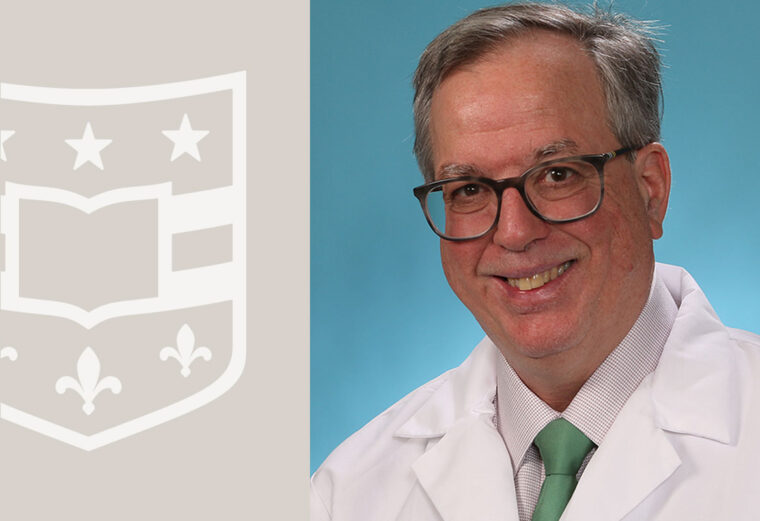
Gregory Lanza MD, PhD, the James R. Hornsby Family Professor in Biomedical Sciences in the John T. Milliken Department of Medicine at Washington University School of Medicine in St. Louis, has been named a fellow of the National Academy of Inventors (NAI). He is an accomplished innovator who has patented numerous nanoparticle-based methods applied in imaging, diagnostics and drug delivery.
The fellows program of the NAI is intended to honor and encourage academic inventors whose contributions have had tangible impacts on society. Lanza joins 170 inventors from 12 countries and 39 U.S. states added to the ranks of NAI fellows this year. There are currently more than 2,000 fellows in the NAI, who collectively have generated 68,000 patents and more than 20,000 licensed technologies.
Lanza, who is a senior member of the NAI, holds 40 patents, 35 of which have been filed since he joined the faculty of WashU Medicine in 1997. Several of these have been licensed and are in use in the medical field.
Among his numerous nanoparticle-based innovations, Lanza and his collaborators have multiple patents relating to targeted perfluorocarbon (PFC) nanoparticles. In 1999, he founded a biotechnology firm, Kereos Inc., which licenses his PFC technology and has partnered with pharmaceutical companies to commercialize them and bring them to market.
PFCs have several capabilities; one notable success is in detecting and locating blood clots. By developing biosafe capsules that deliver PFCs to the bloodstream and bind to blood clots, Lanza made confirming and locating the presence of clots possible using CT scans.
Lanza has also engineered PFCs to facilitate a novel treatment for breast cancers that spread to bone. He designed specialized capsules to release particles capable of entering the cellular matrix that makes up the structure of the bone, carrying with them chemotherapy drugs that would not otherwise be able to penetrate to the tumor's location. These targeted nanotherapies were co-invented in collaboration with Katherine Weilbaecher, MD, the Oliver M. Langenberg Distinguished Professor of the Science and Practice of Medicine in the Division of Oncology, and have been licensed from Washington University in St. Louis by Alembic Pharmaceuticals LTD.
More recently, Lanza co-invented FibroScint, a nanoscale probe that can identify accumulations of material on artificial stents used to treat blocked blood vessels. Capella Imaging, a startup Lanza co-founded, has licensed the technology to radiopharmaceutical company NorthStar. The tool is also being tested to scan for build-up on prosthetic valves, which could improve the reliability and effectiveness of those therapeutic devices.
Lanza collaborates with United Imaging Healthcare and United Imaging Intelligence to improve access to heart and vascular scanning in rural regions of Western countries, as well as in low- and middle-income countries, using cardiac magnetic resonance imaging (cMRI). He has advised the company on improving and revising their program that uses AI-enhanced cMRI scanners that simplify, accelerate and automate image acquisition while performing data analyses, with the goal of using these tools to overcome increasing health-care disparities.
Lanza earned his bachelor's degree from Colby College in Maine, his master's degree and PhD from the University of Georgia, and his MD from Northwestern University Medical School in Chicago before coming to WashU Medicine for residency and fellowship training.
WashU's Office of Technology Management (OTM) will honor Lanza at its annual Celebration of Inventors next spring. View a list of NAI senior members and fellows from WashU on the OTM website.
About Washington University School of Medicine
WashU Medicine is a global leader in academic medicine, including biomedical research, patient care and educational programs with 2,900 faculty. Its National Institutes of Health (NIH) research funding portfolio is the second largest among U.S. medical schools and has grown 56% in the last seven years. Together with institutional investment, WashU Medicine commits well over $1 billion annually to basic and clinical research innovation and training. Its faculty practice is consistently within the top five in the country, with more than 1,900 faculty physicians practicing at 130 locations and who are also the medical staffs of Barnes-Jewish and St. Louis Children's hospitals of BJC HealthCare. WashU Medicine has a storied history in MD/PhD training, recently dedicated $100 million to scholarships and curriculum renewal for its medical students, and is home to top-notch training programs in every medical subspecialty as well as physical therapy, occupational therapy, and audiology and communications sciences.
Originally published on the WashU Medicine website






